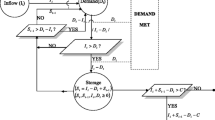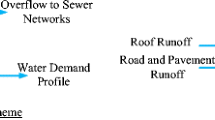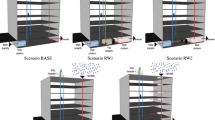Abstract
The Rainwater Harvesting Systems (RWHS) have been used as water conservation alternative to guarantee access to water in urban areas facing increasing demand and climate variability. However, the functioning of these systems depends on socio and economic parameters that usually are defined as constant in traditional viability analyses. The variability of these parameters is not well represented by predefined probability functions, being named in the literature as deep uncertainty factors differentiating from well-characterized uncertainties whose probability functions are known. This research aimed to evaluate the influence of uncertainties (deep and well characterized) in the performance of RWHS in three towns in the State of Goiás, Brazil (Rio Verde, Ipameri and Formosa). Technical (Satisfied Demand - SD, Reliability - REL and Rainwater Consumed - RH) and economic (Net Present Value - NPV, Net Present Value Volume - NPVV and Benefit Cost Rate - BCR) performance criteria were evaluated under a set of 1,000 states of the world comprised of climate (rainfall) and deep uncertainty factors (water tariff, discount rate and operational costs). According to selected performance criteria, the RWHS performed well in 50.01%, 46.19% and 38.01% of the scenarios in Rio Verde, Ipameri and Formosa, respectively. It was possible to illustrate the impact of the water tariff and the discount rate in the performance of RWHS in all three cities showing the need to incorporate the variability of these parameters when evaluating RWHS as alternative source of water supply in urban areas.
Highlights
• Deep Uncertainties had significant influence in the performance of Rainwater Harvesting Systems (RWHS)
• RWHS configurations (differentiated by system demands and roof areas) perform differently when considering isolated or combined economic and technical criteria
• RHWS are more likely to contribute to urban water security when evaluated as an alternative source of water supply
• Households with higher levels of demand and larger roof areas are more likely to benefit from RWHS as an alternative source of water supply in future changing scenarios





Similar content being viewed by others
Availability of Data and Code
The data and codes that support this study are available from the corresponding author upon request.
References
ABNT - Associação Brasileira de Normas Técnicas (2019) NBR 15527: Aproveitamento de água de chuva de coberturas para fins não potáveis - requisitos, 2 edn. Rio de Janeiro
AWWA (2019) State of the water industry report. https://www.awwa.org/Portals/0/AWWA/ETS/Resources/2019_STATE%20OF%20THE%20WATER%20INDUSTRY_post.pdf. Accessed 10 Dec 2021
Brazil, Secretaria Nacional de Saneamento (2021) Sistema Nacional de Informações sobre Saneamento: Tabelas - Informações e Indicadores – 2020. Brasília
Brazil, Secretaria Nacional de Saneamento (2022) Sistema Nacional de Informações sobre Saneamento: Diagnóstico Temático - Serviços de Água e Esgoto – 2020. Brasília, 55 p
Brown C, Boltz F, Freeman S, Tront J, Rodriguez D (2020) Resilience by design: a deep uncertainty approach for water systems in a changing world. Water Secur. https://doi.org/10.1016/j.wasec.2019.100051
Cáceres PS, Ramos SR, Sant’ana DR (2019) Potencial de redução da exploração dos recursos hídricos pelo aproveitamento de água pluvial em edificações residenciais no Distrito Federal. Cadernos de Arquitetura e Urbanismo – Paranoá. https://doi.org/10.18830/issn.1679-0944.n23.2019.02
Campisano A, Butler D, Ward S, Burns MJ et al (2017) Urban Rainwater harvesting systems: research, implementation and future perspectives. Water research. https://doi.org/10.1016/j.watres.2017.02.056
Casal-Campos A, Sadr SMK, Fu G, Butler D (2018) Reliable, resilient and sustainable urban drainage systems: an analysis of robustness under deep uncertainty. Environ Sci Technol. https://doi.org/10.1021/acs.est.8b01193
Casaroli D, Rodrigues TR, Martins APB, Evangelista AWP, Alves J Jr (2018) Padrões de chuva e de evapotranspiração em Goiânia, GO. Rev Bras Meteorol 33(2):247–256
Central Bank of Brazil (2021) Taxas de juros básicas - Histórico. https://www3.bcb.gov.br/sgspub/consultarvalores/consultarValoresSeries.do?method=get. Accessed 15 Dec 2021
Custódio DA, Ghisi A (2019) Assessing the potential for potable water savings in the residential sector of a city: a case study of Joinville city. Water. https://doi.org/10.3390/w11102074
Dallman S, Chaudhry AM, Muleta MK, Lee J (2021) Is rainwater harvesting worthwhile? A benefit-cost analysis. J Water Resour Plann Manage. https://doi.org/10.1061/(ASCE)WR.1943-5452.0001361
Dittrich R, Wreford A, Moran D (2016) A survey of decision-making approaches for climate change adaptation: are robust methods the way forward? https://doi.org/10.1016/j.ecolecon.2015.12.006
Ennenbach MW, Larrauri PC, Lall U (2017) County-scale rainwater harvesting feasibility in the United States: climate, collection area, density, and reuse considerations. J Am Water Resour Assoc (JAWRA). https://doi.org/10.1111/1752-1688.12607
Espinet X, Schweikert A, Chinowsky P (2017) Robust prioritization framework for transport infrastructure adaptation investments under uncertainty of climate change. J Risk Uncertainty Eng Syst. https://doi.org/10.1061/AJRUA6.0000852
Faragò M, Brudler S, Godskesen B, Rygaard M (2019) An eco-efficiency evaluation of community-scale rainwater and stormwater harvesting in Aarhus, Denmark. J Clean Prod. https://doi.org/10.1016/j.jclepro.2019.01.265
Fewkes A, Butler D (2000) Simulating the performance of rainwater collection systems using behavioural models. Build Serv Eng Res Tech. https://doi.org/10.1177/014362440002100204
Giacomazzo AP (2020) Análise de portfólios de planejamento e gestão do sistema de abastecimento urbano do distrito federal no contexto de incertezas profundas. Dissertation - University of Brasília
Gonela V, Altman B, Zhang J, Ochoa E, Murphy W, Salazar D (2020) Decentralized rainwater harvesting program for rural cities considering tax incentive schemes under stakeholder interests and purchasing power restrictions. J Clean Prod. https://doi.org/10.1016/j.jclepro.2019.119843
Haque MM, Rahman A, Samali B (2016) Evaluation of climate change impacts on rainwater harvesting. J Clean Prod. https://doi.org/10.1016/j.jclepro.2016.07.038
Helmrich AM, Chester MV (2020) Reconciling complexity and deep uncertainty in infrastructure design for climate adaptation. Sustain Resilient Infrastruct. https://doi.org/10.1080/23789689.2019.1708179
Hofman-Caris R, Bertelkamp C, Waal L, Brand TVD, Hofman J, Aa RVD, Hoek JPV (2019) Rainwater harvesting for drinking water production: a sustainable and cost-effective solution in the Netherlands? Water. https://doi.org/10.3390/w11030511
IBGE (2021) Panorama cidades. https://cidades.ibge.gov.br/brasil/go/panorama. Accessed 10 Nov 2021
INMET (2021) Banco de Dados Meteorológicos. http://bdmep.inmet.gov.br/. Accessed 05 Feb 2021
Kasprzyk JR, Nataraj S, Reed PM, Lempert RJ (2013) Many objective robust decision making for complex environmental systems undergoing change. Environ Model Softw 42. https://doi.org/10.1016/j.envsoft.2012.12.007
Kim B, Anderson K, Lee S, Kim H (2014) A real option perspective to value the multi-stage construction of rainwater harvesting systems reusing septic tank. Water Resour Manag. https://doi.org/10.1007/s11269-014-0613-3
Kwakkel JH, Haasnoot M, Walker WE (2016) Comparing robust decision-making and dynamic adaptive policy pathways for model-based decision support under deep uncertainty. Environ Model Softw. https://doi.org/10.1016/j.envsoft.2016.09.017
Larrauri PC, Gutierrez JPC, Lall U, Ennenbach M (2020) A city wide assessment of the financial benefits of rainwater harvesting in Mexico City. J Am Water Resour Assoc. https://doi.org/10.1111/1752-1688
Lash D, Ward S, Kershaw T, Butler D, Eames M (2014) Robust rainwater harvesting: probabilistic tank sizing for climate change adaptation. J Water Clim Change. https://doi.org/10.2166/wcc.2014.080
Lempert RJ (2002) A new decision sciences for complex systems. Proc Natl Acad Sci 99:7309–7313. https://doi.org/10.1073/pnas.082081699
Lempert RJ, Groves DG, Popper SW, Bankes SC (2006) A general, analytic method for generating robust strategies and narrative scenarios. Manage Sci. https://doi.org/10.1287/mnsc.1050.0472
Lempert RJ, Popper SW, Bankes SC (2003) Shaping the next one hundred years: new methods for quantitative, long-term policy analysis. Centro Rand Pardee, Santa Monica, p 209
Mitchell VG (2007) How important is the selection of computational analysis method to the accuracy of rainwater tank behaviour modelling? Hydrol Process. https://doi.org/10.1002/hyp.6499
Moraes LRS, Silva AGLS, Dias Neto AA, Borja PC, Prudente AA, Rocha LS (2014) Panorama do saneamento básico no Brasil - Análise situacional do déficit em saneamento básico, vol 2. Ministério das Cidades/Secretaria Nacional de Saneamento Ambiental, Brasília, p 340
Ndeketeya A, Dundu M (2021) Application of HEC-HMS model for evaluation of rainwater harvesting potential in a semi-arid city. Water Resour Manag. https://doi.org/10.1007/s11269-021-02941-0
Nnaji CC, Aigbavboa C (2020) A scenario-driven Assessment of the economic feasibility of Rainwater Harvesting using optimized Storage. Water Resour Manag. https://doi.org/10.1007/s11269-019-02462-x
Pacheco GCR, Alves CMA (2021) Impactos dos critérios de dimensionamento de reservatórios no comportamento dos sistemas de aproveitamento de água pluvial. In: XIV Simpósio Nacional de Sistemas Prediais. Catalão - Goiás. https://doi.org/10.46421/sispred.v2i.1096
Pacheco GCR, Alves CMA (2023) Rainwater harvesting feasibility considering deep uncertainties. [code] 1. https://doi.org/10.5281/zenodo.7566355
Pacheco GCR, Campos MAS (2016) Economic feasibility of rainwater harvesting systems: a systematic literature review. J Water Supply Res T. https://doi.org/10.2166/aqua.2016.048HERMAN
Pacheco GCR, Campos MAS (2019) Real options analysis as an economic evaluation method for rainwater harvesting systems. Water Resour Manag. https://doi.org/10.1007/s11269-019-02371-z
Pavolová H, Bakalár T, Kudelas D, Puskárová P (2018) Environmental and economic assessment of rainwater application in households. J Clean Prod. https://doi.org/10.1016/j.jclepro.2018.10.308
Romero V, Marcuzzo FFN, Cardoso MRD (2014) Trend in the number of days with rain in the state of Goiás and its relationship with extreme ocean Niño index. Bol Goiano de Geografia 34(3):567–584
Saneago (2020) Informações Rio Verde, Formosa e Ipameri. Goiânia
Sant’ana DR (2011) A socio-technical study of water consumption and water conservation in Brazilian dwellings. Thesis, Oxford Brookes University
Silva SA, Ghisi E (2016) Uncertainty analysis of daily potable water demand on the performance evaluation of rainwater harvesting systems in residential buildings. J Environ Manage. https://doi.org/10.1016/j.jenvman.2016.05.028
Souto SL, Reis RPA, Campos MAS (2022) Impact of installing rainwater harvesting system on urban water management. Water Resour Manag. https://doi.org/10.1007/s11269-022-03374-z
Trindade BC, Gold DF, Reed PM, Zeff HB, Characklis GW (2020) Water pathways: an open source stochastic simulation system for integrated water supply portfolio management and infrastructure investment planning. Environ Model Softw. https://doi.org/10.1016/j.envsoft.2020.104772
Trindade BC, Reed PM, Characklis GW (2019) Deeply uncertain pathways? Integrated multi-city regional water supply infrastructure investment and portfolio management. Adv Water Resour. https://doi.org/10.1016/j.advwatres.2019.103442
Trindade BC, Reed PM, Herman JD, Zeff HBE, Characklis GW (2017) Reducing regional drought vulnerabilities and multi-city robustness conflicts using many-objective optimization under deep uncertainty. Adv Water Resour. https://doi.org/10.1016/J.ADVWATRES.2017.03.023
Walker WE, Rahman SA, Cave J (2001) Adaptive policies, policy analysis, and policy-making. Eur J Oper Res. https://doi.org/10.1016/S0377-2217(00)00071-0
Wurthman K (2019) Assessing storage requirements, water and energy savings, and costs associated with a residential rainwater harvesting system deployed across two counties in Southeast Florida. J Environ Manage. https://doi.org/10.1016/j.jenvman.2019.109673
Xu T, Li K, Engel BA, Jia H, Leng L, Sun Z, Yu SL (2019) Optimal adaptation pathway for sustainable low impact development planning under deep uncertainty of climate change: a greedy strategy. J Environ Manage. https://doi.org/10.1016/j.jenvman.2019.109280
Youn S, Chung E, Kang WG, Sung JH (2012) Probabilistic estimation of the storage capacity of a rainwater harvesting system considering climate change. Resour Conserv Recycl. https://doi.org/10.1016/j.resconrec.2012.05.005
Funding
The authors thank University of Brasília Graduate School and Federal Institute of Goiás for its support.
Author information
Authors and Affiliations
Contributions
All authors contributed to the study conception and design. The first draft was written by GCR Pacheco, and CMA Alves reviewed and improved it several times.
Corresponding author
Ethics declarations
Ethics Approval
All authors accept all ethical approvals.
Consent to Participate
All authors consent to participate.
Consent for Publish
All authors consent to publish.
Conflict of Interest
There is no conflict of interest.
Additional information
Publisher’s Note
Springer Nature remains neutral with regard to jurisdictional claims in published maps and institutional affiliations.
Rights and permissions
Springer Nature or its licensor (e.g. a society or other partner) holds exclusive rights to this article under a publishing agreement with the author(s) or other rightsholder(s); author self-archiving of the accepted manuscript version of this article is solely governed by the terms of such publishing agreement and applicable law.
About this article
Cite this article
Pacheco, G.C.R., Alves, C.A. The Influence of Deep Uncertainties in the Design and Performance of Residential Rainwater Harvesting Systems. Water Resour Manage 37, 1499–1517 (2023). https://doi.org/10.1007/s11269-023-03436-w
Received:
Accepted:
Published:
Issue Date:
DOI: https://doi.org/10.1007/s11269-023-03436-w






